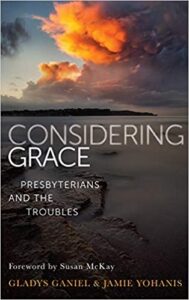 Last week, the Irish Government’s Department of Foreign Affairs hosted a special event in Iveagh House, Dublin, to mark the publication of my book, co-authored with Jamie Yohanis, Considering Grace: Presbyterians and the Troubles.
Last week, the Irish Government’s Department of Foreign Affairs hosted a special event in Iveagh House, Dublin, to mark the publication of my book, co-authored with Jamie Yohanis, Considering Grace: Presbyterians and the Troubles.
As reported on the Presbyterian Church in Ireland’s website:
Tánaiste and Minister for Foreign Affairs Micheál Martin TD welcomed the event and said, “I am very pleased that my Department is co-hosting this event with the Presbyterian Church. Churches and religious communities across the island are key partners on our shared journey of peace and reconciliation.”
Mr Martin continued, “Considering Grace is an important contribution to our understanding of a dark period in our collective past. My Department, through the Reconciliation Fund, is proud to support the Presbyterian Church’s important work advancing understanding and reconciliation on this island, including the complex but vitally important question of how we address the legacy of the past.”
Unfortunately for me, my plans to travel to Dublin for the event were scuppered by a dental emergency. But my co-author, Jamie Yohanis, presented our remarks, which I have reproduced below.
Considering Grace can be purchased here, or on Amazon.
Our Remarks on Considering Grace
Gladys Ganiel:
When he was 15-years-old, Terry Laverty’s brother Robert, a constable in the RUC, was shot dead by the IRA. As young children, the brothers had been so close they slept in the same bed. Devastated, Terry spent his days tramping the beach near his home in Ballycastle, shouting at God. Then one day, he felt God healing him. He was able to identify with the tears of all who were suffering in the Troubles.
Terry became a Presbyterian minister. Pastoring others who had suffered made him even more aware than most that healing does not come easy. But he told us, ‘I want to encourage anybody who is struggling as a result of violence and trauma to consider grace, to consider the hope that Jesus offers, to consider that there is a possibility of living without bitterness and walking on as somebody who is amazingly and wonderfully free.’ Terry’s invitation to ‘consider grace’ inspired the title of the book recognized today.
In 2016 the Presbyterian Church in Ireland’s (PCI) General Assembly approved a proposal to commission a research project on how Presbyterians responded to the Troubles.
I read about the project in a blog written by Rev Tony Davidson. A few weeks later, in a chance meeting with Rev Norman Hamilton, I asked who was carrying out the research. When he told me that hadn’t been decided, I came on board and helped PCI secure funding from the Irish Government’s Reconciliation Fund. This funding allowed for my co-author, Jamie Yohanis, to work for nine months, conducting and transcribing interviews.
I was intrigued by the project because it signalled PCI’s willingness to be self-critical about its own actions during the Troubles. This was in-line with the recommendation of the 2013 report on dealing with the past by American diplomats Richard Haass and Meghan O’Sullivan, which urged societal institutions, as well as combatants, to publicly acknowledge their contributions to division and violence.
Asking people how they thought their church responded to the Troubles provided an opportunity for criticism from within the flock to be heard. Many talked about how they were supported by ministers and congregations in times of injury or bereavement. But people also did not hold back in their criticisms, which included a neglect of some victims, disappointment that PCI did not stand up to the Rev Ian Paisley’s sectarianism, and a lack of emphasis on reconciliation.
Jamie Yohanis:
In Considering Grace we argue that ‘the perceived failures of church institutions may, indeed, need to be publicly acknowledged and forgiven.’ We hope that Considering Grace recognizes such failures and acknowledges PCI’s own need to receive grace, providing inspiration for the church to make peace more central to its mission.
We are heartened that in the years since the publication of this book, churches have begun to acknowledge their failures. In a 2021 event marking the part played by Union Theological College in hosting the parliament of Northern Ireland 100 years ago, the then-Moderator David Bruce acknowledged the role the Presbyterian tradition had played in contributing to ‘the mistakes of imperial hubris’ in its historical conception of ‘the Protestant people as especially anointed by God.’
In addition, the Church Leaders Group has publicly acknowledged the failures of the churches throughout our troubled history, both in its 2021 St Patrick’s Day Statement and in the service of reflection and hope on the centenary of partition and the creation of Northern Ireland, held in 202` at Armagh Cathedral.
During our research, we did not ask people about forgiveness but most, including almost all victims, brought it up themselves. Some had forgiven the perpetrators, others had not, and some hoped they would forgive eventually. One woman admitted skipping the part of the Lord’s Prayer that says, ‘forgive us our debts, as we forgive our debtors.’ Yet one man told us, ‘[Some] people have showed a level of forgiveness a lot of people couldn’t be capable of. … They are all our heroes.’
The anger, sadness and pain that fill the pages of Considering Grace should leave us in no doubt about just how difficult it will be to come to terms with the legacy of Northern Ireland’s past. The stories also remind us that forgiveness is not forgetting – it always includes remembering. Ultimately, Considering Grace asks if people in Northern Ireland, and on the whole island of Ireland, can remember, together, in a way that helps create a better future.